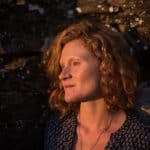Jessica Hatcher
It was the intimacy of the Hall’s architecture that first drew me to it. I grew up in a 17th century coaching inn so I felt at home in the Buttery and under the eaves of my tutor Chris Wells’ stoop-inducing study. Late in the Michaelmas term, Chris would offer me a sherry and we would sit and sip as he talked and cracked medieval-literature jokes in German. I would try to follow but mostly sit back and marvel at the esoteric bubble we inhabited.
I read Modern Languages but considered academia a means to an end, until I was caught off-guard by my fondness for feisty female heroines of the medieval period. My first two years of plenty contrasted sharply with the austerity of the third, when the weight of my academic negligence landed squarely on my shoulders. The night after my last exam remains vivid in my memory––I was so high on relief and elation that I felt sure I would never need sleep again.
The friends I met as a fresher at the Hall are the friends I rely on today. My world expanded rapidly as I got to know them: they spoke fluent Nepalese and went to trance parties; one had spent his summer in Namibia butchering donkeys and feeding them to orphaned cheetah cubs.
One of my few regrets is that I did not get involved in a university newspaper. I didn’t follow British politics or attend debates at the Union and as a result felt that student journalism was not my domain. Enraptured by the goings-on at the Hall, I forgot the promise I made to my 11-year old self: “When I grow up I want to be a journalist”. After leaving Oxford, I moved to London for a job in public relations. Five years elapsed before I saw my by-line in a newspaper.
In 2008, I bicycled 5,000 miles across Africa with two Aularians—the aforementioned donkey butcher and the 2002/3 Hall rugby captain. The trip went on to raise a quarter of a million pounds for the wildlife charity, Tusk. I blogged, kept a diary and made a short documentary. Maybe in Africa, I thought, I would find the space to write.
On returning to the UK, I wrote fiction (unpublished), performance poetry (unperformed, thankfully) and celebrity news and gossip (my bread and butter for a year). But I was no good at any of it. Eventually, after a successful reporting trip to Kenya, I moved to Nairobi to begin a career as a foreign correspondent. Thankfully, I was good at encouraging people to tell me their stories, which is why I stuck with reporting. I covered the 2012 rebellion in eastern Congo, and emerged hoping to follow in the footsteps of journalists who illuminate conflict through the lens of individuals. To do so, I wanted to go beyond tales of victimhood, instead telling stories of people’s virtue and strength in times of crisis.
I met my husband, Phil, a photojournalist from Warwickshire, in the Somali capital of Mogadishu in 2012. By 2017, the year my Guardian story about the unravelling of Burundi won a Frontline Club award, we had married, moved from Nairobi to North Wales, and started a family, while I shifted my focus to the inequity and unfairness that affects women closer to home in the UK. I remain as committed as ever to breaking taboos, addressing injustice, and empowering people to make their voices heard.

Jessica Hatcher
- 2001, Modern Languages